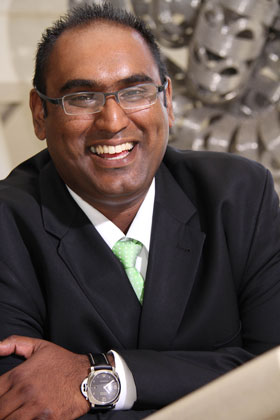
At 7ft tall, Mayan Mathen is easy to spot in a crowd. It also means strangers find him a bit of a novelty and he says he’s often asked to be in pictures with tourists, rather than take pictures of them, when he’s travelling.
Mathen does a great deal of travel in his role as chief technology officer for Dimension Data’s Middle Eastern and African operations. Consequently, he says, he suspects he’s in a large number of holiday albums of people he doesn’t know. He also quips that some of his colleagues call him the “chief travelling officer”.
He has another nickname, too — FBI, short for “big Indian” and preceded by a colourful descriptor. He laughs heartily when I bring it up in a meeting room on the south side of Didata’s sprawling office park, the Campus, in Sandton.
“That’s been with me for many years,” he explains. “It’s a reference to my character, I guess. It’s been my nickname since I was at university. Being 7ft tall, I can’t shake it.”
He says the nickname is light-hearted, which is in keeping with his character. “I’m not a very serious person. I take my work very seriously, but I need to be having fun at it.”
Mathen was at a student at the University of the Witwatersrand when he got his first taste of IT. “I was more interested in the IT department than going to classes.”
Mathen says it’s thanks to others trusting his abilities and giving him opportunities to experiment that he managed to embrace his interest in technology and subsequently turn it into a career. “As a student, I built things in the university’s data centre and campus network, and through that process I was spotted by a networking specialist company,” says Mathen.
That company would eventually become the Bytes Technology Group, a subsidiary of JSE-listed Altron. Mathen spent five years with the company, working in its networking division.
In 2004, he moved to Didata to get what he describes as a “broader view of the technology landscape” and ended up driving the company’s move into unified communications.
“The culture at Dimension Data has become like a drug for me,” he says.
Mathen describes the corporate culture as “entrepreneurial” in that there’s a heavy emphasis on “finding new ways to do things while producing better outcomes”.
Mathen says the move to Didata greatly accelerated his career because his role in business development exposed him to the global IT marketplace.
“Having to be the first ambassador for a company in new territories is a phenomenal experience,” he tells me. “The demand for new business models in new markets and the new technology that can require has opened my mind to new ways of doing things.”
These days, Mathen spends most of his time meeting with clients, vendors, analysts and consulting to Didata businesses. He says his role now is to understand what challenges Didata’s clients face and how best to meet these.
Opportunities are being driven by what Mathen calls the “social, mobile and cloud nexus”. He says the meeting of these three things may prove to be the biggest shift business has had to contend with since the PC and Internet eras collided.
“The change that we’re seeing is being far more accepted than previous historical changes in IT,” he says. “Often, there’s lots of scepticism about change and only with time do things build momentum, but this nexus has just been grabbed and run with.”
Mathen attributes this rapid uptake to the fact that everything around us is increasingly embedded with technology. “We’re in the age of the ‘Internet of things’, where people want one thing to interface with something else. The Internet is now more pervasive than the Web. We want things that can store information, transmit it, and create historical views with it.”
He says the other advantage of technology becoming more pervasive is that uptake is driven by peer pressure. “None of the leading platforms like Google and Facebook force people to use their products, but people’s peers do. You feel alienated if you’re not using them.”
The challenge, says Mathen, is getting companies — particularly those without the younger generation staff — to “shift mindsets”.
Using a 3G connection I can run video calls from my smart devices. There’s a lot of space for enterprise mobility applications but we need to shift mindsets. The more we take ourselves out of the operational mindset of things being finite and costing a certain amount, the more we realise there are now many ways of putting things together.”
Mathen climbed the ranks quickly after joining Didata. “I started out as the leading evangelist for converged communications, working with unified communications. That’s now a large and strategic part of the business. I was the first employee in that business.”
He took on the role of chief technology officer in 2008. It keeps him challenged and he says he isn’t sure what else he would do if he had to make a move. “I’m not sure what I’d do next. Fortunately, I haven’t had to look.”
When he’s not travelling or stomping the corridors at the Campus, Mathen says he’s “fanatical” about Formula One and aircraft.
“Lots of people don’t get it, they think [Formula One] is just about cars going around a track, but I’m fascinated by the science of it,” he says. “I was actually planning my trip to Monza earlier.”
Weekends are dedicated to spending time with his family. He has a seven-year-old son and a young daughter. “I spend my weekends with colouring books and playing outside. My wife and I love experiencing new food and we entertain often and go to functions.”
Mathen says he’s known as the “loud one” at company events and for his penchant for “flaming Lamborghinis” — shooters involving sambuca that is set alight prior to drinking. — (c) 2012 NewsCentral Media




